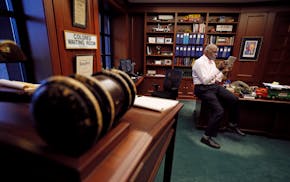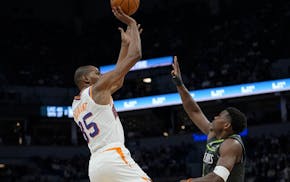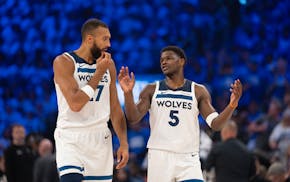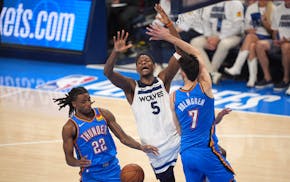Had he remained healthy, J.J. McCarthy would have started at quarterback for the Vikings on Saturday at Cleveland in a preseason game Minnesota won 27-12.
Instead, McCarthy had season-ending knee surgery, turning the team's second preseason game into a contest of reserves.
Can we learn anything about McCarthy's future by studying the past? Are there hints in the career paths of standouts who came before him?
Let's take a look:
- Patrick Mahomes, like McCarthy, was the 10th pick in the draft. He played in one game as a rookie and did not throw a touchdown pass. Working with Andy Reid and watching Alex Smith seemed to help him to the right path.
- Troy Aikman was the first pick in the 1989 draft. He played in 11 games but was pulled for a stretch because he was taking a brutal beating behind a terrible offensive line on a team that would go 1-15. Cretin-Derham Hall's Steve Walsh was the quarterback in the Cowboys' only victory that season. Aikman threw nine touchdown passes and 18 interceptions. He overcame that brutal start to win three Super Bowls and be inducted into the Hall of Fame.
- Dan Marino was the 27th pick in the draft. He got his first NFL playing time in the third game of his rookie season. He was efficient as a rookie, then became the first NFL player to pass for 5,000 yards in a season in his second season, while winning the AP MVP award.
- Joe Montana, a third-round draft pick, started one game and threw 23 passes as a rookie. In his second season, he led the league in completion percentage. In his third season, he led the 49ers to a 13-3 regular-season record and the first of his four Super Bowl victories.
- C.J. Stroud was the second pick in the draft, went to a three-win team with a rookie head coach, and led the Houston Texans to 10 victories and a playoff victory while winning the AP Offensive Rookie of the Year award and throwing just five regular-season interceptions.
- Bryce Young was taken with the first pick, ahead of Stroud in 2023, went to a team that had gone 7-10 the season before, and went 2-14 as a starter.
Now for Vikings history:
- Rich Gannon was a fourth-round draft pick in 1987. He threw 21 NFL passes in his first three seasons. From 1990 to '92 he started 35 games. He became a full-time starter in 1999 with Oakland and led the Raiders to one AFC title game and one Super Bowl berth while winning an AP MVP award.
- Brad Johnson was a ninth-round pick in 1992. He had zero touchdowns and two interceptions as a backup in his first two seasons. After starting for the Vikings, Washington and Tampa Bay, he won the Super Bowl with the Bucs after the 2002 season, beating Gannon.
- Future Viking Brett Favre was the Falcons' second-round pick in 1991. He completed none of his four passes as a rookie and was so unimpressive that the Falcons traded him to Green Bay, where he became a starter and star in 1992.
So what can we learn from the career paths of other great and good quarterbacks?
That every situation and quarterback is unique.
Some, like Aikman, can take a brutal beating as a rookie and learn from it. History is filled with examples of quarterbacks who were broken by such circumstances.
I covered the 1989 Cowboys, and what I remember about Aikman was the simmering rage he felt about losing, and the Cowboys spending a supplemental first-round pick on Walsh.
If you walked through the Cowboys locker room early in 1990, you'd see Aikman doing lunges with massive barbells resting on his shoulders. He put on muscle, studied NFL defenses and prepared himself to become a great player.
McCarthy will have a similar opportunity.
If there is a commonality among great quarterbacks, it is their appetite for physical and mental repetitions. McCarthy can get plenty of mental reps over the next four months, and plenty of physical reps in the offseason, as he tries to create a new pathway to greatness.

Souhan: Anxiety and depression in the NFL helped inspire Lindsey Young's children's book
Souhan: For Lynx star Napheesa Collier, 'Phee' is just fine

Souhan: Will the Wolves trade for Kevin Durant? Should they?

Souhan: If Edwards is a franchise player, he needs to act and play like it

